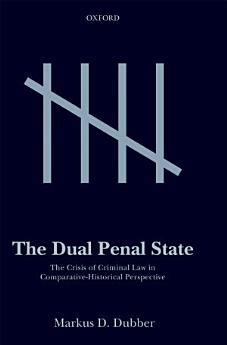The Dual Penal State: The Crisis of Criminal Law in Comparative-Historical Perspective
Sep 2018 · Oxford University Press
Ebook
320
Pages
family_home
Eligible
info
reportRatings and reviews aren’t verified Learn More
About this ebook
In The Dual Penal State, Markus Dubber addresses the rampant use of penal power in Western liberal democracies. The interference with the autonomy of the very persons upon whose autonomy the legitimacy of state power is supposed to rest is systemically normalized, rather than continuously scrutinized. The fundamental challenge of the penal paradox-the prima facie illegitimacy of modern punishment-remains unaddressed and unresolved. Focusing on the United States and Germany, and drawing on his influential account of the patriarchal origins of police power, Dubber exposes the persistence of a two-sided criminal justice regime: the dual penal state. The dual penal state combines principled punishment of equals under the rule of law, on one side, with punitive discipline of others under the rule of police, on the other. Slavery has long played a central role in drawing the line between the two sides of the dual penal state. In Europe, the slave appears in the classic and still foundational accounts of liberal punishment (from Beccaria to Kant) as the paradigmatic other beyond the protection of law, not a legal subject but a mere object of the master's or the state's discretionary discipline. In America, the patriarchal power to police portrays the continuum from the antebellum slaveholder's whipping of his slaves in private and the racial terror perpetrated by slave patrols in public, to the apartheid regime of Jim Crow and the treatment of prisoners as "slaves of the state," and eventually to the late 20th century's systemic racial violence of the “war on crime" and the widespread killing of Black suspects by an increasingly militarized and armed police force that triggered the global Black Lives Matter movement.
About the author
Markus D. Dubber is Professor of Law and Director of the Centre for Ethics at the University of Toronto. Much of his scholarship has focused on theoretical, comparative, and historical aspects of criminal law. He has published, as author or editor, over twenty books and more than eighty papers; he has been translated into German, Arabic, Chinese, Italian, Korean, Persian, Portuguese, and Spanish. His publications include The Oxford Handbook of Criminal Law (2014), Criminal Law: A Comparative Approach (2016, with Tatjana Hörnle), Foundational Texts in Modern Criminal Law (2014), and The Police Power (2005)
Rate this ebook
Tell us what you think.
Reading information
Smartphones and tablets
Install the Google Play Books app for Android and iPad/iPhone. It syncs automatically with your account and allows you to read online or offline wherever you are.
Laptops and computers
You can listen to audiobooks purchased on Google Play using your computer's web browser.
eReaders and other devices
To read on e-ink devices like Kobo eReaders, you'll need to download a file and transfer it to your device. Follow the detailed Help Center instructions to transfer the files to supported eReaders.






